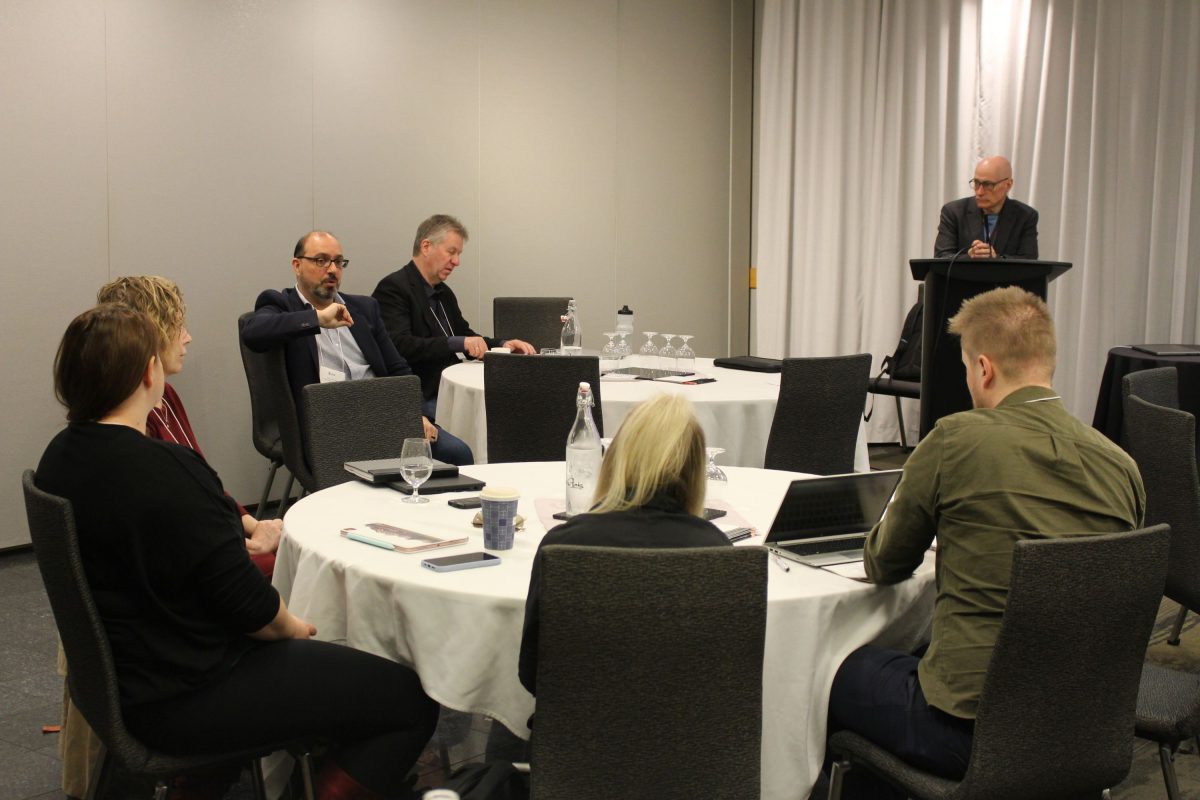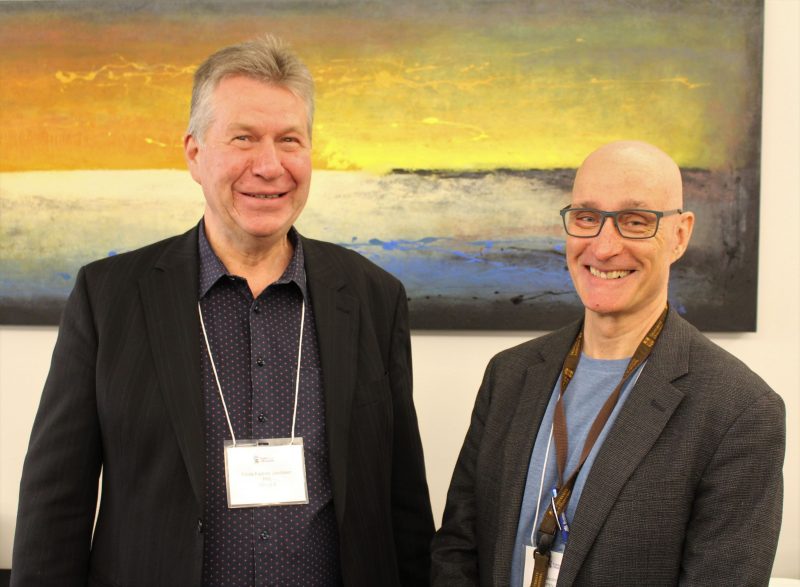
(Top, from left to right) José François, department head of family medicine at the Max Rady Rady College of Medicine, speaks to the audience at the iNET workshop as Dr. Frode Jacobsen, professor at Western Norway University of Applied Sciences, and Dr. Malcolm Doupe, associate professor of community health sciences and emergency medicine at the Max Rady College of Medicine, watch on.
Norwegians in Manitoba to learn about province’s older adult care
A group of health-care researchers, professionals, students and decision-makers from Norway are in Winnipeg this week to learn how older adults are cared for in Manitoba.
The group is taking part in a workshop organized by the International Network to Enhance Older Adult Care Transitions (iNET), which is co-led by University of Manitoba associate professor Dr. Malcolm Doupe. There are 20 people from Norway, 12 from Manitoba and eight from Alberta taking part in the workshop being held from May 8 to 12.
iNET is a partnership that includes Canadian and Norwegian researchers, policy makers, providers, health-care planners and students. The group’s focus is on home care, supportive housing, personal care homes and the transition in and out of hospitals.
“iNet is a diverse, multi-disciplinary group that spends time in each other’s jurisdiction to understand how different health-care systems work,” said Doupe, associate professor of community health sciences and emergency medicine at the Max Rady College of Medicine, Rady Faculty of Health Sciences. “We provide care to older Manitobans using a defined set of programs and strategies — however it’s not the only approach. This network lets our international partners compare each other’s approach and learn from each other. Seeing your system from another person’s perspective is a very important part of health-care reform.”

iNET is co-led by Dr. Frode Jacobsen, professor at Western Norway University of Applied Sciences, and Dr. Malcolm Doupe, associate professor of community health sciences and emergency medicine at the Max Rady College of Medicine.
The workshop attendees are spending half their time visiting health-care facilities around the city, including Deer Lodge Centre, Riverview Health Centre and Misericordia Health Centre. The remainder of the time will feature discussions on what was observed, what was learned, and what differences there are between the countries’ health-care systems.
Along with Doupe, iNET is co-led by Dr. Frode Jacobsen, a professor at Western Norway University of Applied Sciences.
“What we do in this project is really try to understand each other’s health-care system,” Jacobsen said. “We really have a vested interest in looking for promising practices, things we can learn from each other, but also understanding how context really matters. I’m excited about getting to better know how the health care system works here in Manitoba.”
Anita Johansen, who leads 21 nursing homes in Bergen, Norway, made the trip to see how services are organized in Canada.
“We’re hoping to take back reflections on whether we are organizing our services in the right way. Can we do anything different?” Johansen said. “We would like to gain some contacts in Canada so we can exchange thoughts after this trip.”
Dr. Isabel Sebjornsen, a physician and PhD candidate at the University of Bergen, has already learned a lot after just the first day of the workshop.
“I learned that long-term care facilities, at least the one we visited, are so much bigger here. I saw services provided in the long-term care facilities here that are provided by specialist care in Norway. And vice versa, some services that patients are transferred to hospital for here are provided at Norwegian nursing homes,” Sebjornsen said. “So that was interesting.”
iNET held a workshop in Norway in the fall of 2022 that provided Canadian members the chance to see how that country cares for older adults. The group is planning a series of member exchanges in Norway for the fall of 2023.
iNET was established in 2019 and is funded by the Research Council of Norway.
Next week, Doupe and Jacobsen will be holding a two-day workshop in Winnipeg for another project they lead called Knowledge-to-Action (K2A). It’s a research project running from 2021 to 2026 and is funded by the Research Council of Norway. It involves a network of Canadian and Norwegian multidisciplinary researchers, health-care planners, providers and patients who collaborate to improve older adult care transitions between nursing homes and emergency wards.
One initiative that K2A is working on is comparing health-care data between the two countries. However, Norway doesn’t have a comprehensive population-based data repository like the Manitoba Population Research Data Repository that’s housed at the Manitoba Centre for Health Policy, so K2A is aiming to help develop a similar repository in that country.






